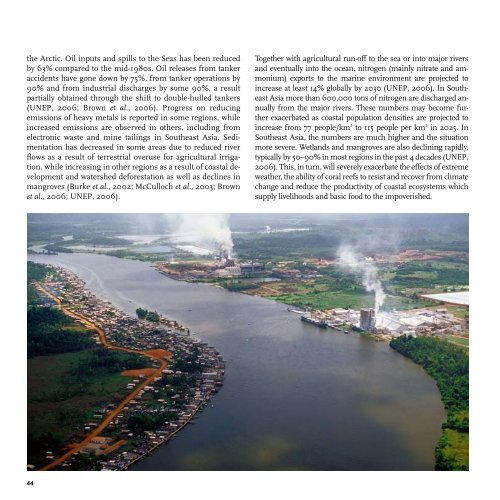In Dead Water: Merging of climate change with - UNEP
In Dead Water: Merging of climate change with - UNEP
In Dead Water: Merging of climate change with - UNEP
You also want an ePaper? Increase the reach of your titles
YUMPU automatically turns print PDFs into web optimized ePapers that Google loves.
the Arctic. Oil inputs and spills to the Seas has been reduced<br />
by 63% compared to the mid-1980s. Oil releases from tanker<br />
accidents have gone down by 75%, from tanker operations by<br />
90% and from industrial discharges by some 90%, a result<br />
partially obtained through the shift to double-hulled tankers<br />
(<strong>UNEP</strong>, 2006; Brown et al., 2006). Progress on reducing<br />
emissions <strong>of</strong> heavy metals is reported in some regions, while<br />
increased emissions are observed in others, including from<br />
electronic waste and mine tailings in Southeast Asia. Sedimentation<br />
has decreased in some areas due to reduced river<br />
flows as a result <strong>of</strong> terrestrial overuse for agricultural irrigation,<br />
while increasing in other regions as a result <strong>of</strong> coastal development<br />
and watershed deforestation as well as declines in<br />
mangroves (Burke et al., 2002; McCulloch et al., 2003; Brown<br />
et al., 2006; <strong>UNEP</strong>, 2006).<br />
Together <strong>with</strong> agricultural run-<strong>of</strong>f to the sea or into major rivers<br />
and eventually into the ocean, nitrogen (mainly nitrate and ammonium)<br />
exports to the marine environment are projected to<br />
increase at least 14% globally by 2030 (<strong>UNEP</strong>, 2006). <strong>In</strong> Southeast<br />
Asia more than 600,000 tons <strong>of</strong> nitrogen are discharged annually<br />
from the major rivers. These numbers may become further<br />
exacerbated as coastal population densities are projected to<br />
increase from 77 people/km 2 to 115 people per km 2 in 2025. <strong>In</strong><br />
Southeast Asia, the numbers are much higher and the situation<br />
more severe. Wetlands and mangroves are also declining rapidly,<br />
typically by 50–90% in most regions in the past 4 decades (<strong>UNEP</strong>,<br />
2006). This, in turn, will severely exacerbate the effects <strong>of</strong> extreme<br />
weather, the ability <strong>of</strong> coral reefs to resist and recover from <strong>climate</strong><br />
<strong>change</strong> and reduce the productivity <strong>of</strong> coastal ecosystems which<br />
supply livelihoods and basic food to the impoverished.

















